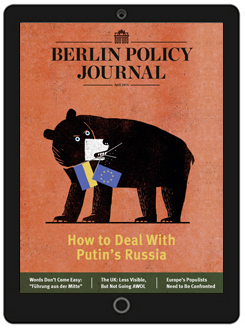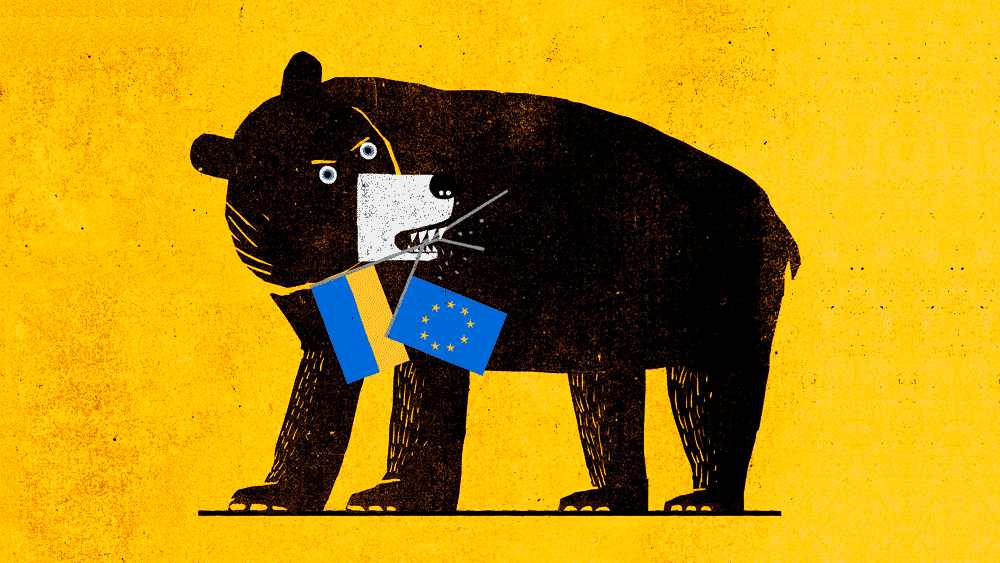Setting a positive agenda, reaching out to Russia’s remaining civil society, and pursuing a mixture of containment and engagement can build a more effective relationship with Russia over a long time frame.
The goals of German and European Russia policy should be to stabilize the situation in Ukraine in the short term, to get Russia’s leadership to the negotiation table in order to work out a new modus vivendi in the medium term, and, in the long term, to forge new relationships in the areas of security, energy, and economics, and to force Moscow’s recognition of international law.Beyond sanctioning certain segments of the Russian elite and specific branches of the economy, German and European policy needs a positive agenda to present to the Russian public. Thus easing of visa restrictions (such as the removal of visa fees or the lowering of entrance requirements) for the great majority of the Russian population should now follow the travel ban on leading representatives of Putin’s system. EU member states could in part make such changes immediately within the existing legal framework, and the act would be symbolic of a policy of engagement with Russian society. Further, existing exchange programs for young elites, journalists, and students (such as the Erasmus program) should be massively expanded. Existing civil society exchange formats should receive more support, and a shift from the dominance of dialogue between elites to a broader dialogue with varied actors within Russian society should follow.
At the same time, improved communication with Russian society and the Russian-speaking minority within the EU must be used as a short-term instrument: Although the Russian leadership is trying to limit cultural exchange, the work of NGOs, and a free press, we can pursue communication streams reaching Russian society directly to explain European policy decisions. Putin appears on German television – leading German and European politicians should do the same in Russia. The half-truths and lies of Russian policy and media outlets must be made transparent. To this end, an Internet platform (in German, English, and Russian) could be developed to systematically counter the Russian leadership’s propaganda through facts and levelheaded analysis, as well as to provide policy arguments. Further, Russian-language media offerings by EU member states should be increased, and a professional and independent Russian-language news program for broadcast on the pan-European channel euronews developed.
It is equally important to expand capacities for the analysis of political, cultural, economic, and security policy-related developments in every post-Soviet state, as well as to improve coordination between EU member states. To this end, cooperation between state and non-governmental institutions and closer coordination with existing political consulting institutes focusing on the countries in question are essential. Central to this is more effective coordination on the European level, as well as increased cooperative strategy development within existing EU frameworks.
Given the current Russian regime, no real policy change is possible; the Russian leadership is using every resource at its command in its fight to retain power, and only regime change could usher in real change. Such change can only come from inside Russia itself, which appears unlikely for the foreseeable future. At the same time, however, there is a risk of further Russian destabilization due to increasingly difficult economic conditions and the strengthening of nationalistic forces at the cost of liberal ones. For this reason, we must pursue a mixture of containment and engagement: keeping Russia in check where necessary and cooperating with it wherever possible, with the aim of medium- to long-term policy change. Projects working to prevent further Russian isolation or to increase understanding of Russian policy must be counted here. Such projects should not legitimize the Russian leadership – as has been the case with the Russo-German Petersburg Dialogue – but rather be developed into true civil society platforms.
In the short term, the situation in Ukraine must be stabilized through agreements recognizing the limited sovereignty of common neighbor states. For the medium term, this means abandoning NATO integration of Ukraine and other states in the region. Parallel to this, new concepts and increased resources are required to enable the stabilization of security institutions in states outside of NATO as well as to offer them a membership perspective over the long term. Should the EU’s policies fail in its immediate neighborhood, its entire security and foreign policy will be called into question.
The OSCE is simply too weak an instrument to negotiate with Russia on security matters or to ensure the security of Ukraine. We must continue to work within the OSCE framework to secure the Ukrainian-Russian border and to include the separatists in that dialogue; at the same time, however, we need to develop a new format in which to discuss these complex hard security questions. The NATO-Russia Council could be one such forum, given that NATO cannot be blocked unilaterally by the Russians and that the US – both a negotiating partner and important security policy actor – is included.
The conflict with Russia is a long-term challenge that requires both a fundamental strategy change as well as a stronger German and EU policy focus, expanded across the entire post-Soviet region. The destabilization potential of the current Russian regime is enormous – both domestically and in its neighborhood. Such a policy change requires grounded analysis, improved cooperation with other EU countries, and consultation with the US. Germany’s improved Eastern European policy will require closer coordination of all parties active in the region.
Read more articles from the April 2015 issue FOR FREE in the Berlin Policy Journal App.








